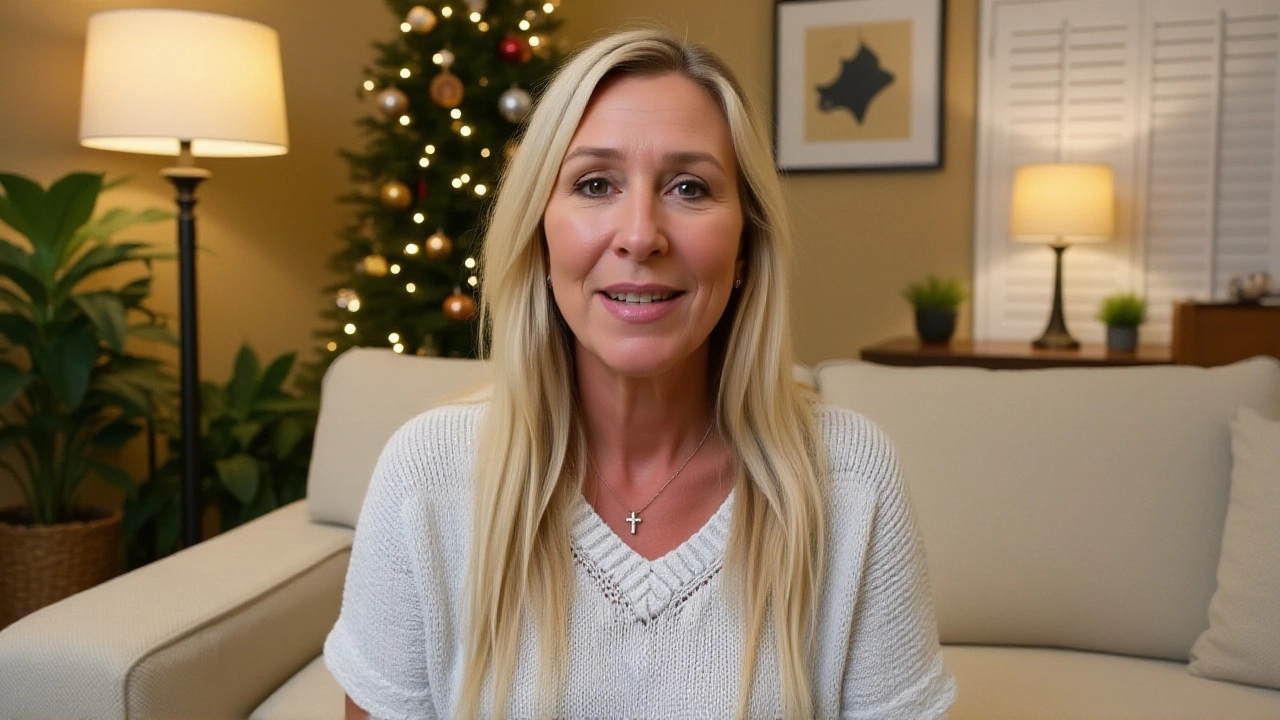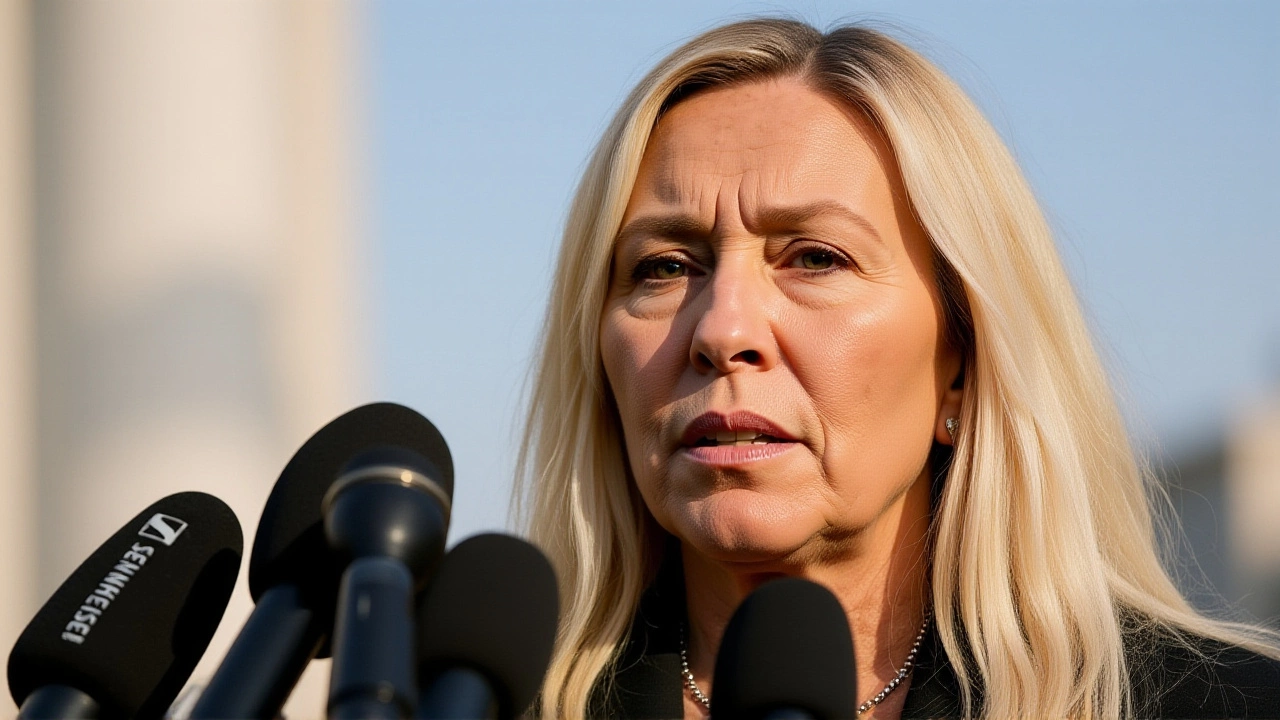The U.S. House of Representatives voted 427-1 on November 14, 2025, to force the release of long-sealed Jeffrey Epstein files — a rare moment of bipartisan unity that shattered party lines and ignited a firestorm within the Republican Party. The lone dissenting vote came from Representative Clay Higgins, a Louisiana Republican and ally of former President Donald Trump, who opposed the move despite his own subcommittee having issued a subpoena for the documents just weeks earlier. The victory was led by Marjorie Taylor Greene, a Georgia congresswoman who, alongside Representatives Thomas Massie, Nancy Mace, and Lauren Boebert, spent four months gathering exactly 218 signatures to force a vote after Speaker Mike Johnson blocked committee action. "Americans are done being lied to," Greene declared on X at 10:47 a.m. EST that same day. "And if those names reach me, I will read them on the House floor."
"I Fought for Him, and He Called Me a Traitor"
Greene’s vow didn’t come out of nowhere. Standing on the West Front Steps of the U.S. Capitol at 9:15 a.m. EST on November 14, flanked by 12 Epstein survivors and seven grieving family members, she cited an estimated 1,000 women who say they were victimized by Epstein. She didn’t stop there. In a blistering critique, she accused every presidential administration since George H.W. Bush — including Donald Trump’s — of participating in a "systemic cover-up." That accusation struck a nerve. Just hours after the vote, at 8:22 p.m. EST, Trump posted on Truth Social: "Marjorie 'Traitor' Greene." The label stuck. And Greene didn’t back down. "A traitor is someone who serves foreign countries and themselves," she said during a Capitol press conference. "A patriot is someone who serves Americans like the women behind me." The feud wasn’t just personal — it was political. Trump’s allies, including Higgins and Representatives Mike Bost and Troy Nehls, had pressured Greene for weeks to withdraw from the petition. She refused. "They called it intimidation," she told reporters. "I called it loyalty to the truth."The Files and the Fallout
The documents in question — roughly 3,200 pages from the U.S. Department of Justice’s case against Ghislaine Maxwell — are expected to be released by December 14, 2025. They include flight logs, financial records, and witness statements tied to Epstein’s network. Among the names rumored to appear: former President Bill Clinton, Prince Andrew, and former Treasury Secretary Larry Summers. None have been formally charged. But the public appetite for clarity is overwhelming. Even the Senate, which had been silent on the issue, voted unanimously 100-0 later that Friday to release the files — a rare show of consensus in a deeply divided chamber. The House vote wasn’t just about transparency. It was about power. Greene, once a fringe figure, has now positioned herself as the most vocal advocate for Epstein survivors — and the most defiant critic of Trump’s lingering influence. Her move has fractured the GOP’s post-Trump alignment. Democrats, meanwhile, watched with quiet satisfaction. House Minority Leader Hakeem Jeffries didn’t comment publicly, but Politico reported that senior Democratic staffers were "gloating" over the internal Republican chaos.
What Comes Next
Greene has promised to read every name from the files aloud on the House floor during the week of November 18–22, 2025. It’s an unprecedented move — a theatrical act of accountability that could dominate headlines for days. The House Ethics Committee will review her conduct on November 20 at 10 a.m. EST, though no formal charges are expected. Meanwhile, the Senate Judiciary Committee, chaired by Senator Chuck Grassley, will hold a hearing on Epstein file transparency on November 26 at 10 a.m. EST in the Hart Senate Office Building. The Department of Justice has already begun redacting names of individuals not connected to criminal activity, per legal guidelines. But Greene says she’ll read them anyway — "even if they’re just a footnote. Because silence is complicity."
Why This Matters
This isn’t just about Epstein. It’s about who gets to control the narrative when powerful people are implicated. For years, survivors were dismissed. Whistleblowers were silenced. Documents were buried under layers of legal maneuvering. Now, a single congresswoman — vilified by her own party’s former leader — is forcing the system to answer. And for the first time in over a decade, the public might finally see who else was in the room.Frequently Asked Questions
What exactly is in the Epstein files being released?
The files, totaling approximately 3,200 pages, come from the U.S. Department of Justice’s prosecution of Ghislaine Maxwell and include flight logs, financial records, emails, and witness statements from the 2019–2021 investigation. While names of high-profile associates are expected, the DOJ will redact individuals not linked to criminal conduct. Survivors’ testimonies and internal communications between Epstein’s associates are among the most anticipated documents.
Why did it take so long to release these files?
House Speaker Mike Johnson blocked committee consideration of the discharge petition in September 2025, citing procedural concerns — though critics argued it was political pressure. The files had been sealed since 2021 under court order pending appeals and redactions. It wasn’t until Greene and her allies gathered the required 218 signatures that the House was forced to vote, bypassing leadership entirely.
How does this affect Epstein survivors?
For the estimated 1,000 women who’ve come forward, the release is a long-overdue validation. Many have spent years fighting disbelief and legal barriers. Reading names on the House floor isn’t just symbolic — it’s a public acknowledgment that their stories matter. Legal advocates say it may also encourage more victims to come forward, especially if new names implicate institutions or public figures who previously operated with impunity.
Why is Trump so angry at Marjorie Taylor Greene?
Trump has long tried to distance himself from Epstein, despite documented social ties. Greene’s public accusations — including her claim that Trump’s administration covered up the case — threaten his political narrative. By branding her a "traitor," he’s attempting to reassert control over the GOP base. But Greene’s defiance has turned her into a symbol of anti-establishment rebellion, even among Trump voters who feel betrayed by the party’s silence.
Will anyone be charged based on these files?
The DOJ has not indicated any new criminal charges are imminent. The files are primarily evidence from the Maxwell case, not a new investigation. However, if names reveal new evidence of obstruction, witness tampering, or active complicity, prosecutors could reopen old cases or initiate new ones. Legal experts say the real impact may come from civil lawsuits — which could follow quickly after the documents are made public.
What’s the significance of Greene reading names on the House floor?
No member of Congress has ever read names from sealed Epstein documents aloud on the floor. It’s a deliberate act of confrontation — turning bureaucratic secrecy into public spectacle. It forces the public to confront uncomfortable truths and pressures institutions to respond. While some call it performative, survivors say it’s the first time their pain has been given a microphone in the most powerful chamber in the country.

